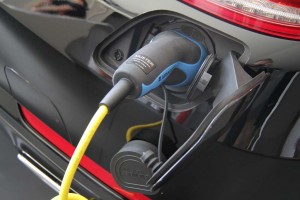If you’ve been thinking about buying a new battery-electric vehicle in an effort to be kinder to the environment, a new study suggests you might want to think again. According to its authors, EVs might actually worsen global warming.
If you’re charging up your new battery-car using electricity generated from coal, it turns out, you’ll actually create nearly four times as much soot, while increasing the amount of CO2 going into the atmosphere – while also increasing smog deaths, according to the new study by the University of Minnesota.
“It’s kind of hard to beat gasoline,” despite its bad reputation among environmentalists, said study co-author and engineering professor Julian Marshall. “A lot of the technologies that we think of as being clean,” he added, “are not better than gasoline.”
According to the study, which was published in the Proceedings of the National Academy of Sciences, pure battery-electric vehicles, or BEVs, would create 86 more deaths from air pollution than do gas-powered vehicles.
The key problem, the study notes, is that coal is used to produce 39% of the electricity used in the United States, particularly on the eastern side of the country.
For battery cars “to have large improvements in the environmental health impacts of transportation relative to our current technology… that electricity needs to be clean,” stressed Marshall.
Using natural gas to produce electricity would cut by half the number of air pollution deaths caused by the automobile. Using “green” energy sources, such as wind, solar or hydro, would eliminate three-quarters of the air pollution fatalities.
The study was kinder when it came to less advanced hybrid vehicles which recapture energy normally lost during braking or coasting to boost their fuel efficiency.
The Minnesota researchers also examined alternative fuels, such as ethanol, and found many of them also lacking when it came to environmental benefits. From an environmental standpoint, ethanol is “the wrong path” as an alternative to gasoline, warned co-author Jason Hill.
(Nearly half of all EVs sold in California. For more, Click Here.)
The new Minnesota study is bound to kick off new debate about the benefits – or hazards – of electric vehicles.
A 2013 study warned that because of China’s heavy reliance on coal, the government’s aggressive push to switch from gasoline to electric vehicles could actually worsen that country’s endemic smog problems.
(Click Here for details about OPEC’s plans for oil prices.)
Even a joint study by the Environmental Defense Fund and the Natural Resources Defense Council raised concerns about battery-power due to the heavy use of coal generators – though their report suggested that, on the whole, the U.S. would come out better with more BEVs on the road.
(To see how the tap of your watch can bring your BMW to you, Click Here.)
“Unfortunately, when a wire is connected to an electric vehicle at one end and a coal-fired power plant at the other end, the environmental consequences are worse than driving a normal gasoline-powered car,” environmental scientist Ken Caldeira, of the Carnegie Institute for Science, told research site Climate Central in response to the new Minnesota study.


It has been known for years that ethanol fueled cars in the U.S. were a complete scam for a few to profit from. It’s also been known by many that EV’s have other important issues such as toxic waste and crash issues that have been ignored. When there is money involved, you can always find so folks willing to dupe the public for profit.
Crash issues I am assuming you are referring to fires. US statistics report 90 fires per billion miles in an ICE. With the 280,000 US based EVs having driven well over 2 billion miles and registering less fires than you can count on your fingers, the safety comparison is staggering.
Next time, please actually read the study before reporting. This headline and article completely misrepresents and backwardizes what the study actually concluded. EV’s start off life cleaner than coal, and actually get cleaner as the grid gets cleaner, while gas cars start off as polluters and then pollute more as they age. The article totally omits the fact that many gasoline cars use more electricity than electric cars, because an EV can travel over 24 miles on the electricity used to refine a single gallon. That’s only a part of production, and doesn’t even count the exploration and distribution electric demands of our gasoline infrastructure.
So as noted EVs and ethanol are both impractical and akin to outright lies to the public with the toxic battery issues being ignored while hucksters profit from the gullible populace.
SOS, DD. Welcome to America.